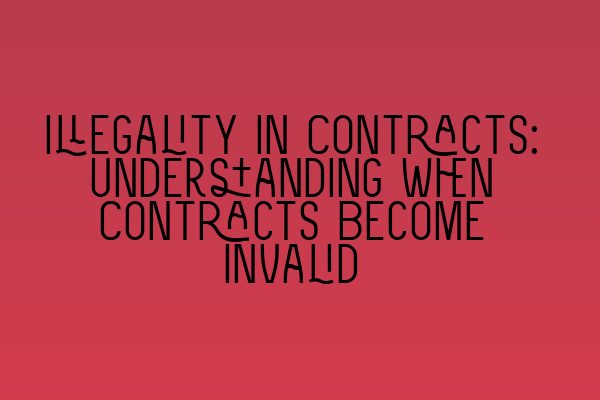Illegality in Contracts: Understanding When Contracts Become Invalid
Contracts are essential legal agreements that provide structure and security in countless transactions and business dealings. However, not all contracts are valid or enforceable. In some cases, certain contracts may be deemed illegal, rendering them invalid from the start. Understanding when contracts become invalid is crucial for individuals and businesses alike to avoid legal disputes and potential financial consequences.
What is an Illegal Contract?
An illegal contract is a legally unenforceable agreement that violates specific laws or public policy. These contracts involve activities that are prohibited by law, either explicitly or implicitly. Engaging in an illegal contract is not only risky, but it can also result in serious legal consequences, such as fines, penalties, or even criminal charges.
Examples of Illegal Contracts
Let’s delve into some common scenarios where contracts may become illegal:
1. Contracts Contrary to Statute: Certain agreements may violate specific statutes or regulations, such as contracts for illegal substances or illegal activities like gambling or prostitution. These contracts are considered illegal and unenforceable since they involve actions that the law forbids.
2. Contracts Against Public Policy: Contracts that go against public policy are also deemed illegal. These include contracts that promote illegal, unfair, or unethical practices. For example, a contract that seeks to limit a person’s right to free speech or engage in discriminatory behavior would be considered against public policy.
3. Contracts Involving Frustration of Criminal or Tortious Acts: Contracts that require or involve the commission of a crime or a tortious act are illegal. A tortious act refers to a wrongful action resulting in harm to another, such as fraud or deceit. These types of contracts are considered void and unenforceable as they encourage unlawful behavior.
4. Contracts in Restraint of Trade: Contracts that unreasonably restrict a person’s freedom to engage in their trade or profession are generally unenforceable. Such agreements may limit competition or impose unfair conditions that impede fair business practices.
5. Contracts with Minors or Mentally Incapacitated Individuals: Contracts with minors or individuals who lack mental capacity are often deemed unenforceable. Minors are generally recognized as lacking the legal capacity to enter into binding contracts, while those lacking mental capacity may not fully comprehend the terms and consequences of the agreement.
Consequences of Illegality in Contracts
If a contract is found to be illegal, the consequences can be severe for all parties involved. The contract becomes void ab initio, meaning it is considered invalid from the beginning. This nullifies any obligations and rights under the agreement, and the parties are no longer bound by its terms. In some cases, engaging in an illegal contract may lead to legal action, fines, or other penalties imposed by the court.
Additionally, if one party has already performed their obligations under an illegal contract, they may not be entitled to recover any payments or remedies. In such instances, the principle of “ex turpi causa non oritur actio” applies, meaning that a person cannot seek legal recourse based on an illegal contract.
How to Avoid Illegal Contracts
Understanding the potential illegality of contracts is vital for avoiding legal pitfalls. Here are some tips to ensure you stay on the right side of the law:
1. Seek Legal Advice: It is advisable to consult with a solicitor or legal professional when drafting or entering into a contract. They can assess the contract’s legality and help you navigate complex legal requirements and potential legal risks.
2. Stay Informed: Educate yourself on the laws and regulations relevant to your industry or specific contract. Understanding legal limitations and requirements will help you avoid entering into illegal contracts unknowingly.
3. Conduct Due Diligence: Before entering into any contractual agreement, conduct thorough research on the parties involved. Ensure they are legally capable of entering into the contract and that the terms do not violate any laws or public policy.
4. Regularly Review and Update Contracts: Laws and regulations can change over time, so it is essential to regularly review and update your contracts to ensure compliance. Retaining the services of a solicitor can be invaluable in this regard.
Conclusion
Contracts form the foundation of many legal relationships and business transactions, providing clarity and security for all parties involved. However, it is crucial to remember that not all contracts are valid or enforceable. Understanding when contracts become invalid is essential to ensure compliance with the law and avoid potential legal disputes. By seeking legal advice, staying informed, conducting due diligence, and regularly reviewing contracts, individuals and businesses can protect themselves from engaging in illegal contracts and the resulting legal consequences.
Related Articles:
– Securing Training Contracts: A Roadmap to Becoming a Solicitor
– Mentorship for Aspiring Solicitors: Nurturing Talent in the Legal Field
– Legal Challenges and Pitfalls: Navigating the Complexities of the Legal System
– The GDL (Graduate Diploma in Law): A Pathway to Becoming a Solicitor
– Mastering the Solicitor’s Path: Prepare for the Journey Ahead
